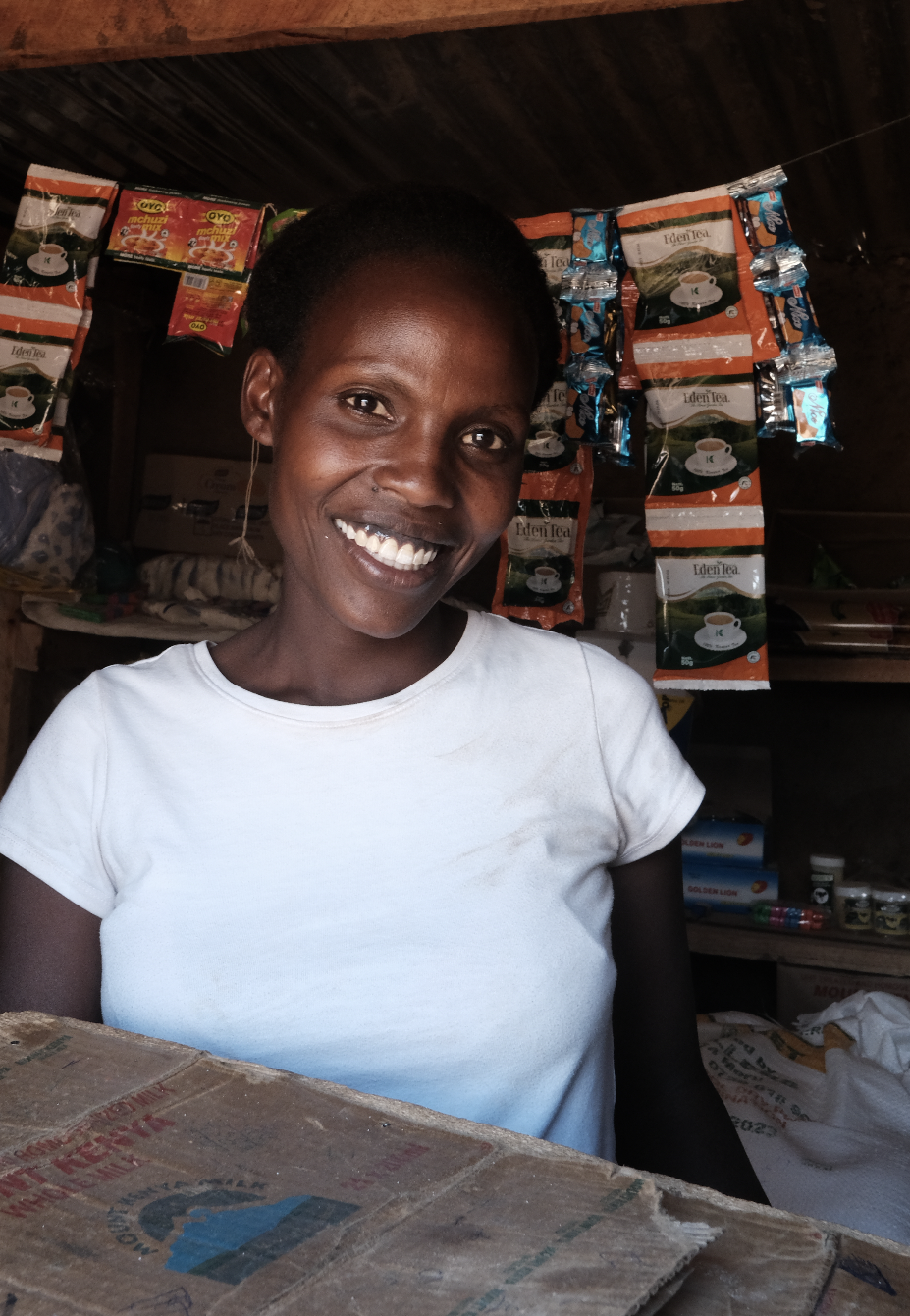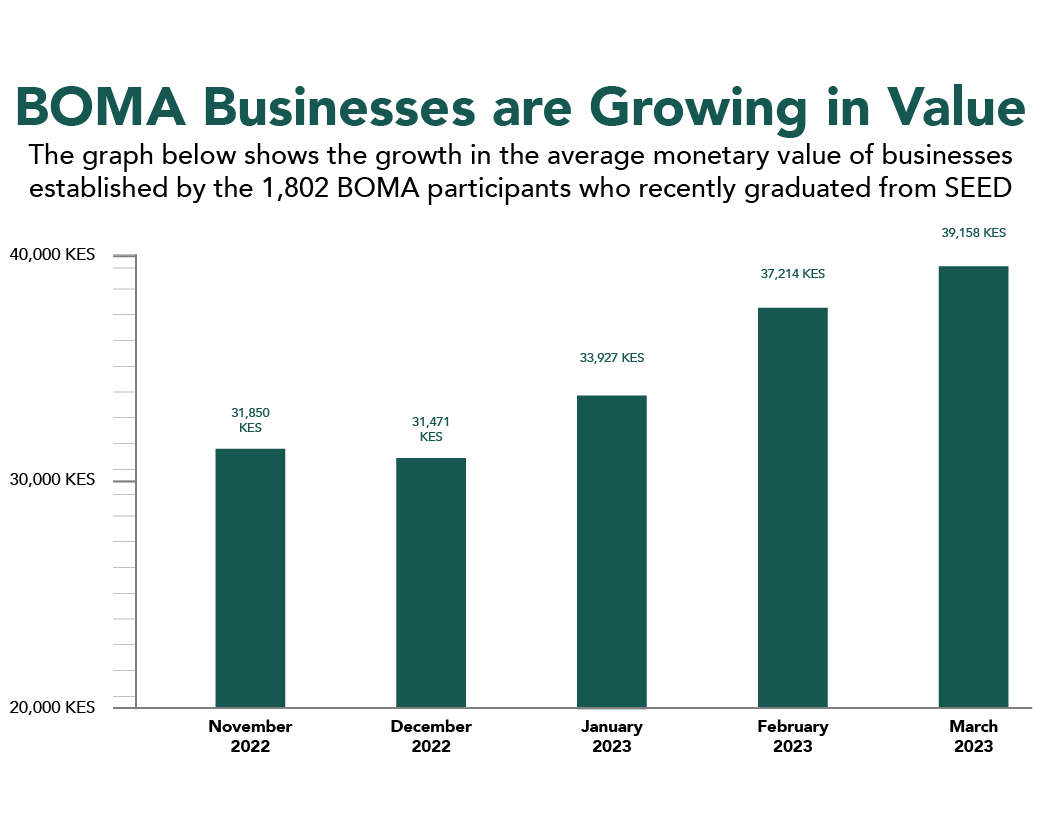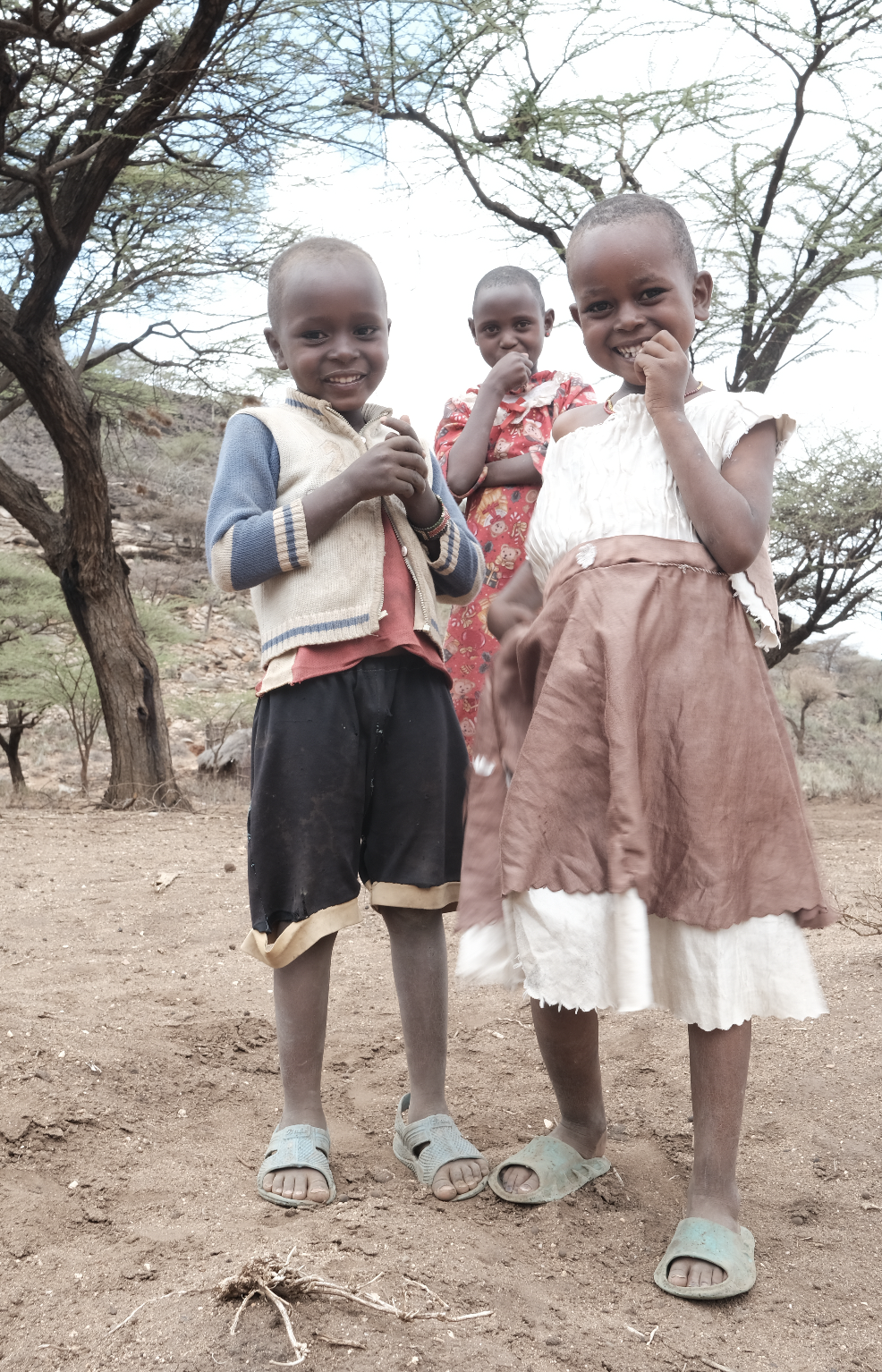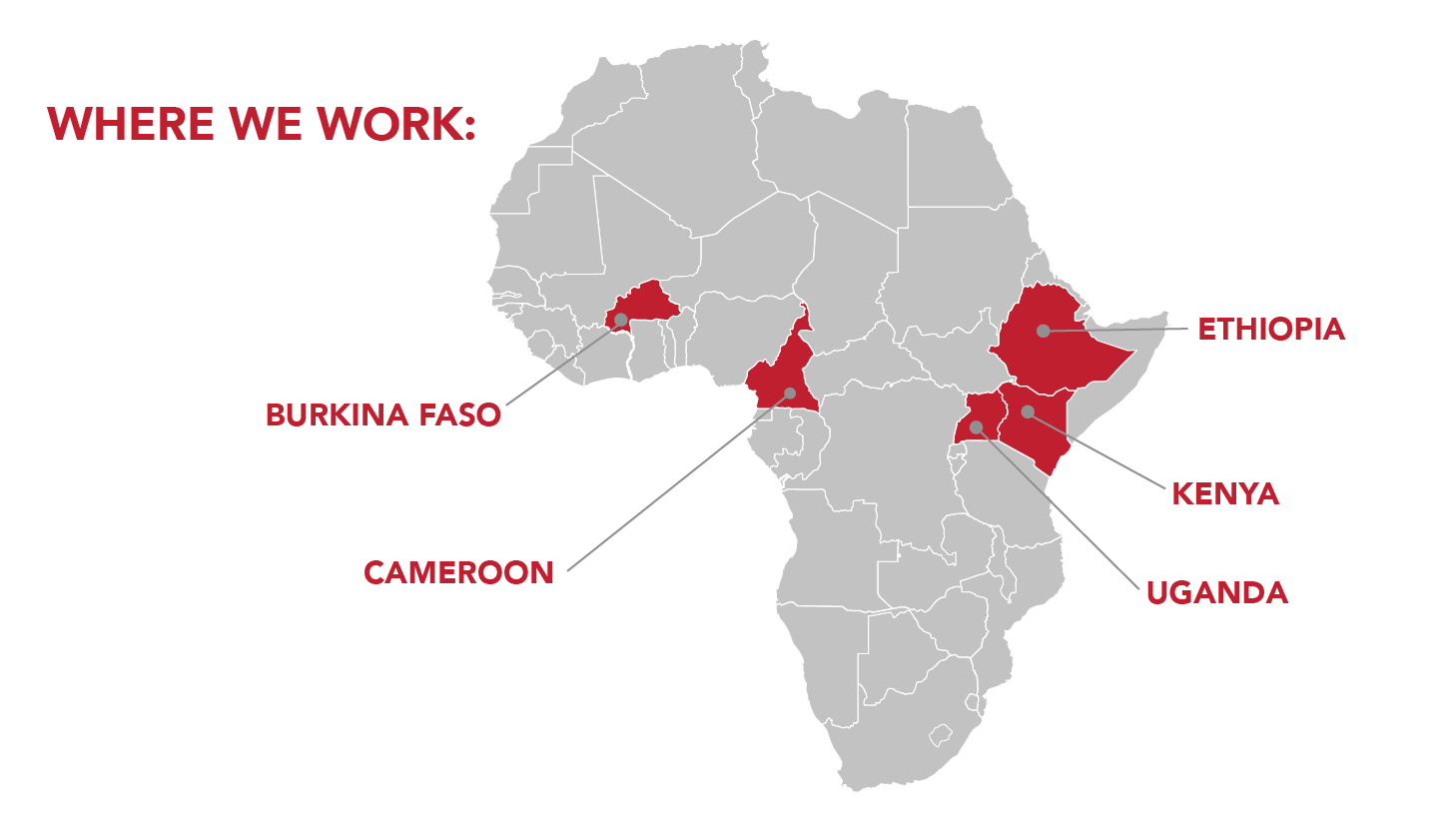The Latest News from BOMA

BOMA has been helping people escape extreme poverty since 2009. We are currently working in five countries—Kenya, Uganda, Ethiopia, Cameroon, and Burkina Faso—to promote entrepreneurship in rural areas. Our goal is to improve the lives of three million women, youth, and refugees by 2027.
BOMA’s program, called the Rural Entrepreneur Access Program (REAP), was originally designed for pastoral women. However, it has now been adapted to also benefit youth, refugees, households facing malnutrition, and those affected by the climate crisis. They reach the poorest communities in various ways: by implementing REAP directly, partnering with other organizations to implement adapted versions of REAP, and working with the government through the Kenya Social Economic Inclusion Project (KSEIP).
KSEIP is a project led by the Government of Kenya and funded by the World Bank. It aims to expand the country’s safety net programs for the poor and test approaches to alleviate poverty. As part of KSEIP, BOMA is collaborating with the Kenyan Ministry of Labor and Social Protection, Global Development Incubator, and Village Enterprise to integrate BOMA’s model and poverty alleviation approach into the government’s social protection program.
Before KSEIP, BOMA conducted a pilot program in collaboration with the Government of Kenya, the International Fund for Agriculture Development (IFAD), and BRAC USA. This pilot program, which took place from 2017 to 2019, tested the effectiveness of REAP in lifting extremely poor households out of poverty and integrating the poverty alleviation approach into the government’s social protection systems. The success of this pilot program prepared BOMA to establish strong collaboration and partnerships with the government.
To learn more about the pilot program and its findings, click here.
News from Our Programs in Kenya
We have some updates to share about our work in Kenya. First, we’re excited to launch a new program called LIFT funded by IKEA Foundation, in Northern Kenya. It will help people in that region by providing them with support and opportunities. Additionally, we’re testing a shorter version of our REAP model in Turkana, Samburu, Wajir, Garissa, Marsabit, and Moyale. This program will provide intensive mentoring for participants over 12 months instead of the usual 16-24 months.
In the first quarter of this year, we successfully graduated 13,607 participants in Kenya. Among them, 1,082 were young people who took part in our youth-focused REAP model. This program, called the SEED Project for Vulnerable and Marginalized Youth, aims to help young individuals break free from challenges and create sustainable livelihoods. Despite difficulties such as drought, inflation, and instability, these young entrepreneurs from Isiolo, Marsabit and Moyale have seen their businesses grow since joining the program in the spring of 2022.

News from Our Programs in Uganda
In Uganda, BOMA is working with several organizations to help refugee and host communities in the Yumbe District. They aim to improve child protection, create sustainable livelihoods, and support natural resource management.
They conducted a review of a three-year project called “Street Children – Prevention through Sustainable Graduation from Poverty” (PSGP), which will end in October 2023. The review found that the project is still relevant, and participants are satisfied with its comprehensive approach. They will implement recommended improvements and conduct a final evaluation.
The Nuyok project, funded by USAID, aimed to improve the lives of vulnerable families in Northeastern Uganda. BOMA enrolled 1,635 vulnerable women in Napak district as part of this project. An endline report showed that participants made significant progress in providing for their families, achieving food security, and having a say in household decisions.
The report also highlighted improvements in income, savings, livestock ownership, and female participation in income-generating activities. Access to improved drinking water sources also increased.
During the project, 445 out of 545 businesses were still operating at the end, showing the value of mentoring and group unity. However, the COVID-19 pandemic and security concerns affected some businesses.
Overall, the project helped improve the participants’ businesses, with the most significant improvements seen between February 2021 and January 2022.

News from Our Programs in Ethiopia
BOMA has teamed up with Caritas Switzerland in Ethiopia to help 5,100 new participants in the Oromia region. The project aims to address extreme poverty, climate change, and financial exclusion of women and youth in pastoralist communities.
In this quarter, BOMA and Caritas Switzerland conducted a survey called the Standard of Living Index (SOLI) in several regions. This survey helps BOMA identify participants and measure progress in improving their standard of living. They collected data from 875 participants by asking questions about demographics, income, savings, expenditures, and food security.
To better understand the challenges faced by women, men, and youth, they also evaluated norms and beliefs related to gender roles, power dynamics, legal rights, decision-making, and conflicts. They collected data on gender issues, conflict resolution, and peacebuilding from 296 respondents.
They also collected data on conflicts at the community level to identify the causes and triggers of conflicts in the region and potential conflicts within households. The analysis of the survey data will be available soon.
News from Our Programs in Burkina Faso
In Burkina Faso, BOMA has joined forces with Caritas Switzerland, APIL, and Foundation Hirondelle to support refugees and host families in the Sanmatenga Province. They aim to enroll 3,000 participants in a program that will strengthen their resilience.
During the first quarter, BOMA and their partners worked together to identify eligible participants and form small business groups. They held a workshop in January to facilitate the creation of these groups, ensuring a proper balance of internally displaced people, host communities, women, and men. Program staff received training on market assessment, business plan development, and simplifying business plans. By March, 1,000 business groups were formed, and their business plans were completed with the help of program staff.
In addition, staff members dedicated to data collection underwent training on best practices and maintaining data quality. They successfully collected household income data for 1,014 participants.
News from Our Programs in Ethiopia
BOMA is providing technical assistance to the Danish Refugee Council (DRC) to create a program for refugees in Cameroon. The project aims to support 2,000 participants, including refugees from the Central African Republic and host communities.
During this quarter, BOMA and DRC focused on adapting BOMA’s REAP model to the specific needs of refugee populations in Cameroon. BOMA conducted a feasibility study to assess the program’s relevance and gathered insights into the local commercial sectors and necessary resources.
The study also identified factors that could affect the REAP program’s implementation, such as existing programs and policies, integrating participants from different nationalities, religions, and ethnicities, and potential changes in household and gender dynamics.
Our teams are getting ready to start training our staff and conducting a mid-term evaluation during the second quarter.

